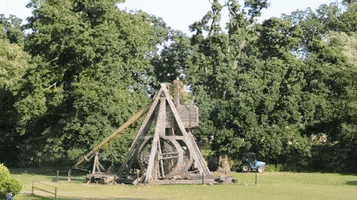There was a big difference in the speed at which crops migrated. The practice of planting crops began in Central America around 7000 BC but it didn't get to the Eastern USA for another 5000 years and even then it didn't completely replace hunter-gathering. The spread of agriculture from the fertile crescent was earlier by about 1500 years and was much quicker, taking only a few centuries to travel similar distances.
The variety of domesticated crops and animals was also greater in Eurasia.
Oxen and horses, for example, are much better for pulling ploughs and rapid transport than llamas.
All Eurasian advantages over the African and American continents.
Added to the comparative ease of planting crops in similar latitudes and lack of barriers such as deserts or dense tropical forests geographic differences played a bigger part in the development of civilisations than culture.
The late Bronze Age collapse
-
Montegriffo

- Posts: 18852
- Joined: Wed Nov 30, 2016 7:14 am
Re: The late Bronze Age collapse
Death, death, to the IDF.


-
Speaker to Animals

- Posts: 38685
- Joined: Wed Nov 30, 2016 5:59 pm
Re: The late Bronze Age collapse
I think you are close to the truth here. I think it has more to do with the fact that, even though we take this kind of technology for granted now, it's not obvious to a hunter-gather group why agriculture is worthwhile in the long run. Lots of technologies, especially metallurgy and ceramics, do not see the true pay off for quite a long time, historically. I mean.. ceramics was important for storing food, but it's far more important to us today with our semiconductors and ceramic armor. It's more of a kind of random exploration of technologies and ideas until a group of people seize on some direction of experimentation that yields the technologies that lead towards civilization. I don't think geography had really anything to do with it.Montegriffo wrote: Thu May 07, 2020 5:20 pm There was a big difference in the speed at which crops migrated. The practice of planting crops began in Central America around 7000 BC but it didn't get to the Eastern USA for another 5000 years and even then it didn't completely replace hunter-gathering. The spread of agriculture from the fertile crescent was earlier by about 1500 years and was much quicker, taking only a few centuries to travel similar distances.
The variety of domesticated crops and animals was also greater in Eurasia.
Oxen and horses, for example, are much better for pulling ploughs and rapid transport than llamas.
All Eurasian advantages over the African and American continents.
Added to the comparative ease of planting crops in similar latitudes and lack of barriers such as deserts or dense tropical forests geographic differences played a bigger part in the development of civilisations than culture.
But once you have civilizations, a fucked up culture is not going to allow you to advance as fast as a culture not nearly as fucked up. The problem for the PC crowd here is that they want to imagine our culture as being particularly evil or bad when, really, we are the most successful cultures for a reason.
-
Montegriffo

- Posts: 18852
- Joined: Wed Nov 30, 2016 7:14 am
Re: The late Bronze Age collapse
Geography granted several advantages for the advancement of agriculture and the food surpluses needed to allow for specialisation.Speaker to Animals wrote: Thu May 07, 2020 5:24 pmI think you are close to the truth here. I think it has more to do with the fact that, even though we take this kind of technology for granted now, it's not obvious to a hunter-gather group why agriculture is worthwhile in the long run. Lots of technologies, especially metallurgy and ceramics, do not see the true pay off for quite a long time, historically. I mean.. ceramics was important for storing food, but it's far more important to us today with our semiconductors and ceramic armor. It's more of a kind of random exploration of technologies and ideas until a group of people seize on some direction of experimentation that yields the technologies that lead towards civilization. I don't think geography had really anything to do with it.Montegriffo wrote: Thu May 07, 2020 5:20 pm There was a big difference in the speed at which crops migrated. The practice of planting crops began in Central America around 7000 BC but it didn't get to the Eastern USA for another 5000 years and even then it didn't completely replace hunter-gathering. The spread of agriculture from the fertile crescent was earlier by about 1500 years and was much quicker, taking only a few centuries to travel similar distances.
The variety of domesticated crops and animals was also greater in Eurasia.
Oxen and horses, for example, are much better for pulling ploughs and rapid transport than llamas.
All Eurasian advantages over the African and American continents.
Added to the comparative ease of planting crops in similar latitudes and lack of barriers such as deserts or dense tropical forests geographic differences played a bigger part in the development of civilisations than culture.
But once you have civilizations, a fucked up culture is not going to allow you to advance as fast as a culture not nearly as fucked up. The problem for the PC crowd here is that they want to imagine our culture as being particularly evil or bad when, really, we are the most successful cultures for a reason.
I don't think it's a coincidence that technologies such as metallurgy were far more advanced in Eurasia than other parts of the world. Same with writing and developments such as the wheel.
The geographic advantages which made farming more efficient allowed for fewer hands needed to till the earth and led to larger and more advanced civilisations with their greater range of specialisation and innovation.
Death, death, to the IDF.


-
Speaker to Animals

- Posts: 38685
- Joined: Wed Nov 30, 2016 5:59 pm
Re: The late Bronze Age collapse
There were no geographic advantages, Monte. They were literally trading crops across the entire landmass.Montegriffo wrote: Thu May 07, 2020 5:38 pmGeography granted several advantages for the advancement of agriculture and the food surpluses needed to allow for specialisation.Speaker to Animals wrote: Thu May 07, 2020 5:24 pmI think you are close to the truth here. I think it has more to do with the fact that, even though we take this kind of technology for granted now, it's not obvious to a hunter-gather group why agriculture is worthwhile in the long run. Lots of technologies, especially metallurgy and ceramics, do not see the true pay off for quite a long time, historically. I mean.. ceramics was important for storing food, but it's far more important to us today with our semiconductors and ceramic armor. It's more of a kind of random exploration of technologies and ideas until a group of people seize on some direction of experimentation that yields the technologies that lead towards civilization. I don't think geography had really anything to do with it.Montegriffo wrote: Thu May 07, 2020 5:20 pm There was a big difference in the speed at which crops migrated. The practice of planting crops began in Central America around 7000 BC but it didn't get to the Eastern USA for another 5000 years and even then it didn't completely replace hunter-gathering. The spread of agriculture from the fertile crescent was earlier by about 1500 years and was much quicker, taking only a few centuries to travel similar distances.
The variety of domesticated crops and animals was also greater in Eurasia.
Oxen and horses, for example, are much better for pulling ploughs and rapid transport than llamas.
All Eurasian advantages over the African and American continents.
Added to the comparative ease of planting crops in similar latitudes and lack of barriers such as deserts or dense tropical forests geographic differences played a bigger part in the development of civilisations than culture.
But once you have civilizations, a fucked up culture is not going to allow you to advance as fast as a culture not nearly as fucked up. The problem for the PC crowd here is that they want to imagine our culture as being particularly evil or bad when, really, we are the most successful cultures for a reason.
I don't think it's a coincidence that technologies such as metallurgy were far more advanced in Eurasia than other parts of the world. Same with writing and developments such as the wheel.
The geographic advantages which made farming more efficient allowed for fewer hands needed to till the earth and led to larger and more advanced civilisations with their greater range of specialisation and innovation.
The problem inherent in these kinds of ideas is that proponents take for granted the obviousness of certain paths of technological inquiry. But they really are not that obvious when you don't have the benefit of hindsight and the pay off for those developments is not till many generations later. Geography is not the reason they were behind us. It was part random luck of us deciding to take these paths of development earlier as well as their own cultural problems that kept them from advancing as civilizations once they did have agriculture.
They even had bronze working in the Andean civilizations but they didn't see the use for it. It's not obvious to people right off the bat that you can do these other things. Just like it wasn't obvious to the Chinese that you could use gunpowder to make guns.
-
Montegriffo

- Posts: 18852
- Joined: Wed Nov 30, 2016 7:14 am
Re: The late Bronze Age collapse
There were, I've listed several of them. Greater varieties of easily domesticated plants and animals, similar latitudes, fewer geographic barriers.Speaker to Animals wrote: Thu May 07, 2020 5:39 pmThere were no geographic advantages, Monte. They were literally trading crops across the entire landmass.Montegriffo wrote: Thu May 07, 2020 5:38 pmGeography granted several advantages for the advancement of agriculture and the food surpluses needed to allow for specialisation.Speaker to Animals wrote: Thu May 07, 2020 5:24 pm
I think you are close to the truth here. I think it has more to do with the fact that, even though we take this kind of technology for granted now, it's not obvious to a hunter-gather group why agriculture is worthwhile in the long run. Lots of technologies, especially metallurgy and ceramics, do not see the true pay off for quite a long time, historically. I mean.. ceramics was important for storing food, but it's far more important to us today with our semiconductors and ceramic armor. It's more of a kind of random exploration of technologies and ideas until a group of people seize on some direction of experimentation that yields the technologies that lead towards civilization. I don't think geography had really anything to do with it.
But once you have civilizations, a fucked up culture is not going to allow you to advance as fast as a culture not nearly as fucked up. The problem for the PC crowd here is that they want to imagine our culture as being particularly evil or bad when, really, we are the most successful cultures for a reason.
I don't think it's a coincidence that technologies such as metallurgy were far more advanced in Eurasia than other parts of the world. Same with writing and developments such as the wheel.
The geographic advantages which made farming more efficient allowed for fewer hands needed to till the earth and led to larger and more advanced civilisations with their greater range of specialisation and innovation.
Hunter-gatherers not only have fewer opportunities for specialisation but also less need for technological innovation.
Better conditions for agriculture led to more specialisation, larger civilisations and a quicker spread of ideas across large distances led to more innovation. All helped along by more favourable geographic conditions.
Death, death, to the IDF.

